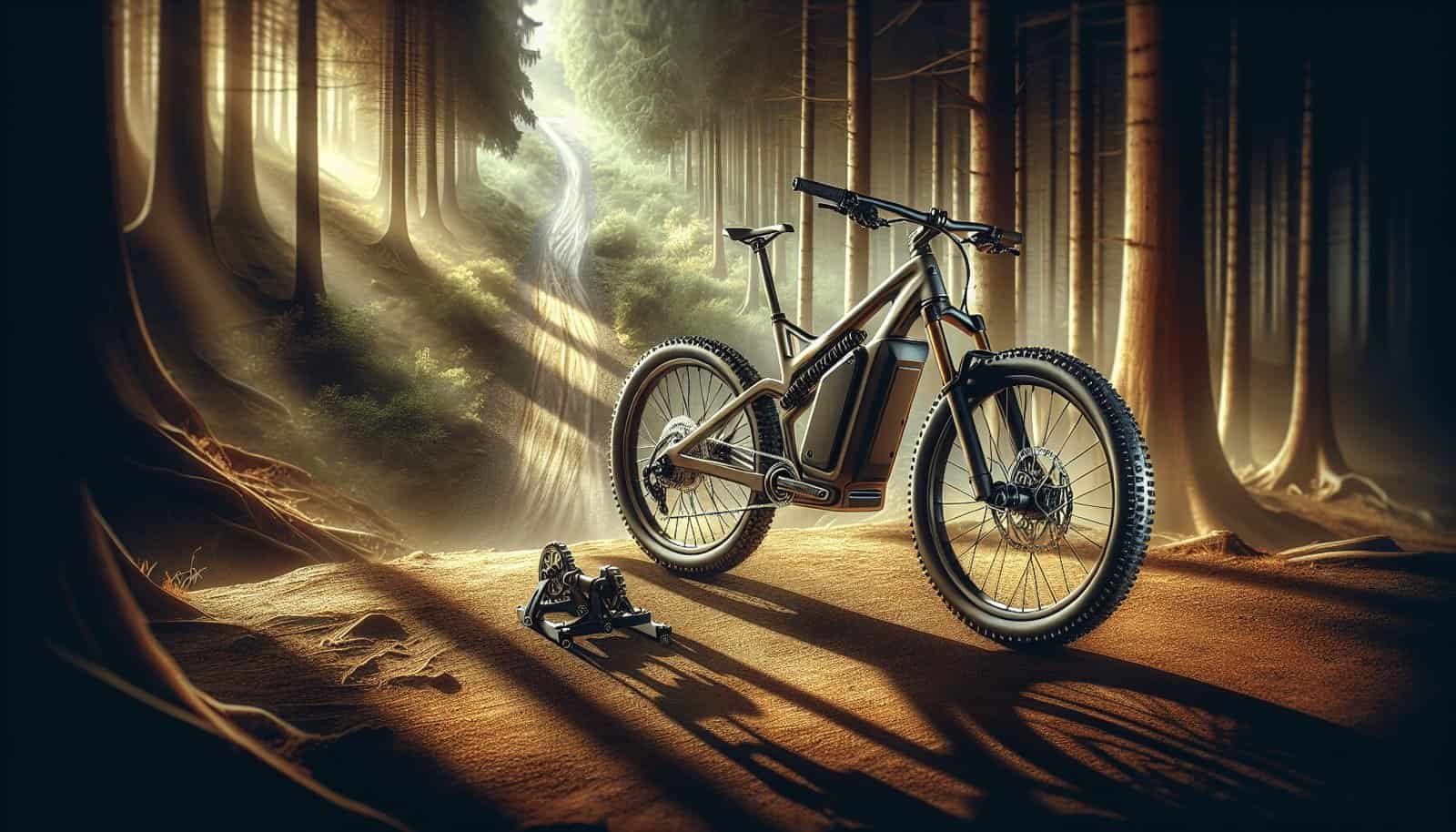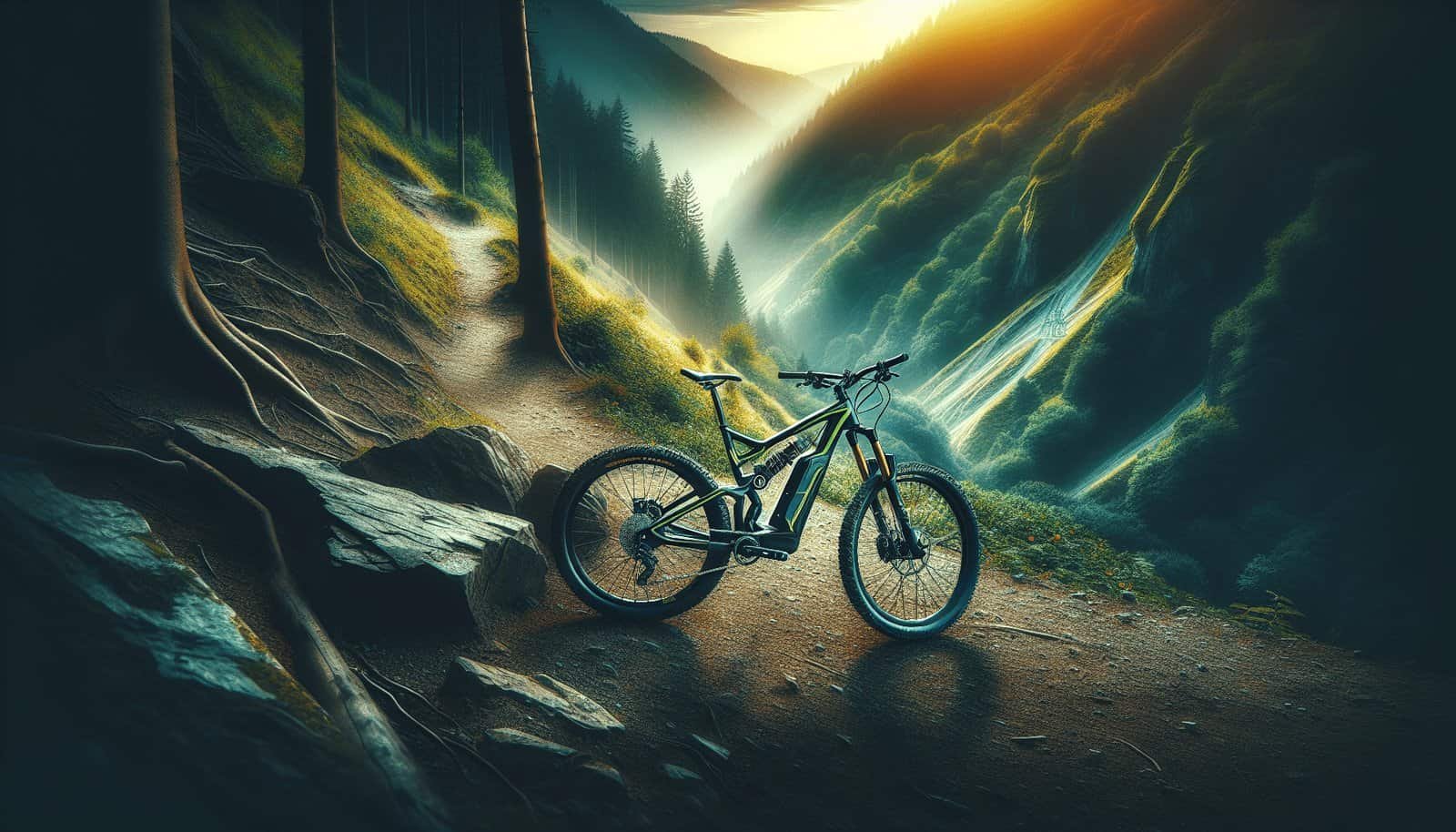If you’re an adventurous soul with a love for mountain biking, you might find yourself wondering, “Are electric bikes suitable for off-road mountain biking?” It’s a question that has been debated among enthusiasts, and in this article, we’ll explore the pros and cons of using electric bikes on rugged terrain. So fasten your helmet and get ready to embrace the exciting world of off-road electric biking!
What are electric bikes?
Definition
Electric bikes, also known as e-bikes, are bicycles that are equipped with a small electric motor to assist riders in pedaling. These bikes use rechargeable batteries that provide power to the motor, offering riders the option to pedal themselves or rely on the motor for assistance. Electric bikes have become increasingly popular in recent years, offering a convenient and environmentally-friendly alternative to traditional bicycles.
Features
Electric bikes come with a range of features designed to enhance the riding experience. These may include different levels of pedal assist, allowing riders to adjust the amount of assistance provided by the motor. Some electric bikes also come equipped with throttle control, allowing riders to simply twist a handle to activate the motor without pedaling. Additionally, many electric bikes have built-in displays that provide information such as speed, battery life, and distance covered.
Types of electric bikes
There are several types of electric bikes available for off-road mountain biking. These include:
- Hardtail electric bikes: These bikes have suspension in the front fork but no rear suspension. They are a popular choice for riders who prioritize efficiency and climbing ability.
- Full suspension electric bikes: These bikes have both front and rear suspension, offering increased comfort and control on rough terrain. They are a great option for riders who prefer a smoother ride and better traction.
- Fat tire electric bikes: These bikes are equipped with wide, knobby tires that provide excellent traction and stability on loose surfaces like sand or snow. They are particularly well-suited for off-road riding in challenging conditions.
Advantages of using electric bikes for off-road mountain biking
Increased speed and distance
One of the key advantages of using electric bikes for off-road mountain biking is the ability to cover more ground in a shorter amount of time. The electric motor provides a boost to your pedaling power, allowing you to maintain higher speeds and cover greater distances. This can be particularly beneficial when riding on challenging terrain or during long rides.
Assistance in climbing hills
Electric bikes are especially advantageous when it comes to climbing hills. The motor provides an extra boost of power, making it easier to tackle steep inclines. This can be a game-changer for riders who struggle with climbing or want to explore more challenging trails without exhausting themselves.
Reduced physical exertion
Electric bikes help to reduce the physical exertion required when riding off-road. The motor assistance means that riders can enjoy the thrill of mountain biking without pushing themselves to their physical limits. This makes off-road riding more accessible for riders of different fitness levels or those recovering from injuries.
Extended riding time
The battery-powered motor of electric bikes allows for extended riding time. Rather than relying solely on your own stamina, the motor provides assistance when needed, allowing you to ride for longer periods without feeling fatigued. This can be particularly beneficial for riders who want to embark on longer adventures or explore remote areas.
Accessibility for all fitness levels
Electric bikes make off-road mountain biking more accessible for riders of all fitness levels. Whether you’re a beginner or an experienced rider, the motor assistance ensures that you can enjoy the thrill of off-road riding without feeling overwhelmed by the physical demands. This inclusivity expands the potential for more individuals to experience the joy and challenge of mountain biking.

Challenges of using electric bikes for off-road mountain biking
Additional weight
One of the main challenges of using electric bikes for off-road mountain biking is the added weight. The electric motor and battery increase the overall weight of the bike, making it heavier to maneuver and potentially affecting the bike’s handling and agility. This additional weight may require some adjustment in riding style and technique, particularly when navigating tight turns or technical terrain.
Limited battery life
Another challenge of electric bikes is the limited battery life. Depending on the capacity of the battery and the level of assistance used, the range of an electric bike can vary. Longer rides or rides in hilly terrain can quickly drain the battery, requiring riders to carefully plan their rides and consider the distance they can cover before needing to recharge. This limitation may affect the overall flexibility and spontaneity of off-road mountain biking.
Technical limitations
While electric bikes offer many advantages, they also have certain technical limitations. The motor assistance is reliant on the battery’s power, and if the battery runs out or malfunctions, the bike may become difficult to ride. Additionally, the motor may not provide assistance at low speeds or while coasting downhill, requiring riders to rely more on their own pedaling power. It is important for riders to be aware of these limitations and plan their rides accordingly.
Skill requirement
Off-road mountain biking, whether on a traditional bike or an electric bike, requires a certain level of skill and technique. However, using an electric bike does not eliminate the need for skill development. Riders must still possess basic mountain biking skills, such as balance, bike handling, and trail navigation. Additionally, riders must familiarize themselves with the motor’s settings and understand when and how to use the assistance effectively.
Environmental impact
While electric bikes are a more eco-friendly option compared to cars or motorcycles, there are still environmental considerations to be aware of. The production and disposal of battery components, as well as the electricity used for charging, contribute to the carbon footprint of electric bikes. However, the overall impact is still lower compared to traditional vehicles. It is important for riders to be conscious of their environmental impact and explore ways to reduce it, such as using eco-friendly charging methods or opting for bikes with more sustainable components.
Factors to consider when choosing an electric bike for off-road mountain biking
Power and motor
The power and motor of an electric bike play a crucial role in the overall performance and capabilities of the bike. Consider factors such as motor wattage, torque, and the type of motor (hub motor or mid-drive motor). A more powerful motor generally provides better assistance on steep inclines or challenging terrain.
Battery capacity
Battery capacity determines the range and duration of the electric bike’s assistance. Consider the battery’s voltage, watt-hours, and whether it is removable or integrated into the frame. Higher-capacity batteries provide longer rides, but they also add more weight to the bike.
Suspension
Off-road mountain biking requires a bike with proper suspension to absorb shocks and provide a smoother ride. Look for electric bikes with front suspension, rear suspension, or full suspension, depending on your riding preferences and the types of trails you will be tackling.
Tires
The type of tires on an electric bike can greatly impact its off-road performance. Look for tires with good traction, durability, and suitable tread patterns for the types of surfaces you will be riding on. Fat tires can be particularly beneficial for off-road riding as they provide enhanced stability and traction on loose or uneven terrain.
Frame and durability
Choose an electric bike with a sturdy and durable frame that is designed for off-road use. Look for features such as reinforced welds, strong materials (like aluminum or carbon fiber), and proper geometry. A well-built frame will ensure better handling, stability, and longevity of the bike.
Price range
Electric bikes come in a wide range of prices, so it is important to consider your budget when choosing a bike for off-road mountain biking. Remember to factor in additional costs such as accessories, maintenance, and potential upgrades. It is worth investing in a higher-quality electric bike if you plan to do frequent off-road riding to ensure better performance and longevity.

Safety considerations for off-road electric mountain biking
Helmet and protective gear
Safety should be a top priority when engaging in off-road mountain biking. Always wear a well-fitting helmet to protect your head in the event of a fall or collision. Additionally, consider wearing other protective gear such as knee pads, elbow pads, and gloves to prevent injuries.
Training and experience
Off-road mountain biking requires a certain level of skill and experience. Take the time to learn and develop your mountain biking skills before venturing onto more challenging trails. Consider taking a skills course or riding with more experienced riders to improve your technique and gain confidence.
Trail conditions
Before heading out on an off-road electric mountain biking adventure, it is important to assess the trail conditions. Trails can vary greatly in difficulty, terrain, and obstacles. Be aware of any current trail closures or restrictions and choose trails that are suitable for your skill level and the capabilities of your electric bike.
Riding etiquette
Respect other trail users and follow proper riding etiquette. Yield to hikers and equestrians, slow down and announce your presence when passing, and avoid riding on closed or unauthorized trails. Being a responsible and considerate rider helps to maintain a positive relationship between mountain bikers and other trail users.
Emergency preparedness
Off-road mountain biking can be unpredictable, so it is important to be prepared for emergencies. Carry a basic first aid kit, a cell phone for communication, and any necessary repair tools. Familiarize yourself with basic bike maintenance and repair skills, such as fixing a flat tire or adjusting brakes.
Comparison between electric bikes and traditional mountain bikes for off-road riding
Speed and power
Electric bikes offer a significant advantage in terms of speed and power compared to traditional mountain bikes. The motor assistance allows riders to maintain higher speeds and tackle challenging terrain with greater ease. Traditional bikes rely solely on the rider’s physical strength and stamina.
Physical exertion
One of the main differences between electric bikes and traditional mountain bikes is the level of physical exertion required. Electric bikes provide assistance, reducing the overall effort required from the rider. Traditional mountain bikes, on the other hand, rely solely on human power, resulting in a higher level of physical exertion.
Range and battery life
Electric bikes have the advantage of extended range and battery life compared to traditional mountain bikes. The motor assistance allows riders to cover more ground and ride for longer periods without feeling fatigued. Traditional bikes, however, require the rider to maintain their own stamina throughout the ride.
Maintenance
Both electric bikes and traditional mountain bikes require regular maintenance to ensure optimal performance and longevity. However, electric bikes may require additional maintenance due to the electrical components, such as checking the battery, motor, and controller. Traditional mountain bikes, on the other hand, may require more frequent chain lubrication and brake adjustments.
Cost
Electric bikes generally have a higher upfront cost compared to traditional mountain bikes due to the additional components and technology involved. However, the cost of owning and maintaining a traditional mountain bike can also add up over time. Consider your budget and long-term financial commitment when deciding between an electric bike and a traditional bike.

Best electric bikes for off-road mountain biking
Brand A
Brand A offers a range of electric bikes specifically designed for off-road mountain biking. Their bikes feature powerful motors, long-lasting batteries, and high-quality suspension systems. Brand A’s commitment to durability, performance, and innovative design makes their electric bikes a top choice for off-road enthusiasts.
Brand B
Brand B is known for producing electric bikes that excel in off-road conditions. Their bikes boast robust frames, high-capacity batteries, and reliable motors. With a focus on rider comfort and control, Brand B delivers exceptional performance and durability for off-road mountain biking enthusiasts.
Brand C
Brand C offers a variety of electric bikes that cater to off-road mountain biking. Their bikes are equipped with advanced motor technology, adjustable suspension systems, and rugged tire options. Brand C’s attention to detail and customer feedback make their electric bikes a popular choice among riders seeking an off-road adventure.
Brand D
Brand D stands out in the electric bike market with their off-road models designed for maximum performance. These bikes feature cutting-edge motor technology, high-capacity batteries, and top-notch suspension systems. Brand D’s commitment to quality components and exceptional craftsmanship ensures a thrilling off-road experience.
Tips for maximizing electric bike performance in off-road conditions
Proper gear shifting
Understanding how and when to shift gears is essential for maximizing an electric bike’s performance off-road. Proper gear shifting allows for efficient power transfer and helps maintain a steady cadence. Experiment with different gears to find the most suitable combination for various terrains and inclines.
Optimizing battery usage
To extend the battery life of your electric bike during off-road rides, it is important to optimize its usage. Utilize lower levels of assistance when the terrain allows, relying more on your own pedaling power. Plan your route to take advantage of flat or downhill sections where the motor assistance can be minimized or even turned off.
Maintaining traction and stability
Off-road mountain biking requires maintaining traction and stability on various terrains. Adjust your tire pressure according to the conditions, lower pressure for improved grip on loose surfaces, and higher pressure for better efficiency on paved or hard-packed trails. Additionally, practice proper body positioning and weight distribution to maintain balance and control.
Developing technical skills
Off-road mountain biking on an electric bike still requires technical skills. Take the time to develop and improve your biking skills, such as navigating obstacles, cornering, and maintaining control at higher speeds. Practice on different terrains and gradually challenge yourself to build confidence and proficiency.
Regular maintenance
To ensure optimal performance and longevity of your electric bike, regular maintenance is crucial. Keep the chain clean and properly lubricated, regularly check tire pressure, inspect brakes, and tighten any loose components. Periodically check the battery for signs of wear and follow proper charging and storage procedures as outlined by the manufacturer.

Case studies: Experiences of off-road mountain bikers with electric bikes
Biker A’s perspective
Biker A, an experienced mountain biker, shares their experience with electric bikes for off-road riding. Biker A appreciates the assistance provided by the electric bike on challenging climbs, allowing them to explore more trails and cover greater distances. The extended riding time and reduced physical exertion make off-road riding more enjoyable and accessible. Biker A highlights the importance of skill development and responsible trail use, emphasizing that electric bikes should enhance the experience rather than replace the effort required to be a skilled rider.
Biker B’s perspective
Biker B, a beginner in the world of mountain biking, shares their perspective on using an electric bike for off-road riding. Biker B initially felt intimidated by the physical demands of mountain biking but found that the assistance provided by the electric bike made it more approachable. The increased speed and reduced physical exertion allowed Biker B to focus on improving their technical skills and building confidence on the trails. Biker B highlights the importance of safety precautions and proper etiquette to ensure a positive and respectful experience for all trail users.
Biker C’s perspective
Biker C, an avid outdoor enthusiast, provides their perspective on using an electric bike for off-road mountain biking. Biker C enjoys the extended range and battery life of the electric bike, allowing them to embark on longer adventures and explore more remote areas. The added weight and limited battery life are viewed as trade-offs, but Biker C believes that the benefits outweigh the challenges. Biker C emphasizes the need for regular maintenance and responsible environmental practices, taking care of the trails and minimizing their impact while enjoying the thrill of off-road riding.
Conclusion
In conclusion, electric bikes offer numerous advantages for off-road mountain biking. Their increased speed, assistance in climbing hills, and reduced physical exertion make off-road riding more accessible and enjoyable for riders of all fitness levels. However, it is important to consider the challenges, such as additional weight, limited battery life, technical limitations, skill requirements, and environmental impact.
When choosing an electric bike for off-road mountain biking, factors such as power and motor, battery capacity, suspension, tires, frame, durability, and price range should be carefully considered. Safety considerations, such as wearing protective gear, training and experience, trail conditions, riding etiquette, and emergency preparedness, are essential for a positive and safe riding experience.
Comparing electric bikes to traditional mountain bikes reveals differences in speed and power, physical exertion, range and battery life, maintenance, and cost. Ultimately, personal preference and individual needs will determine whether an electric bike or a traditional bike is the better choice for off-road riding.
Several brands stand out as some of the best options for off-road electric mountain biking, offering powerful motors, long-lasting batteries, durable frames, and exceptional performance. Maximizing electric bike performance off-road can be achieved through proper gear shifting, optimizing battery usage, maintaining traction and stability, developing technical skills, and regular maintenance.
Through case studies, we gain insights into the experiences of off-road mountain bikers with electric bikes. From seasoned riders to beginners, the consensus is that electric bikes enhance the off-road riding experience by providing assistance and enabling riders to explore more trails while still requiring basic skills and responsible trail use.
In the end, the suitability of electric bikes for off-road mountain biking depends on personal preference, fitness level, desired riding experience, and environmental considerations. Electric bikes offer a unique opportunity to push the boundaries of off-road riding and make mountain biking accessible to a wider range of individuals.


